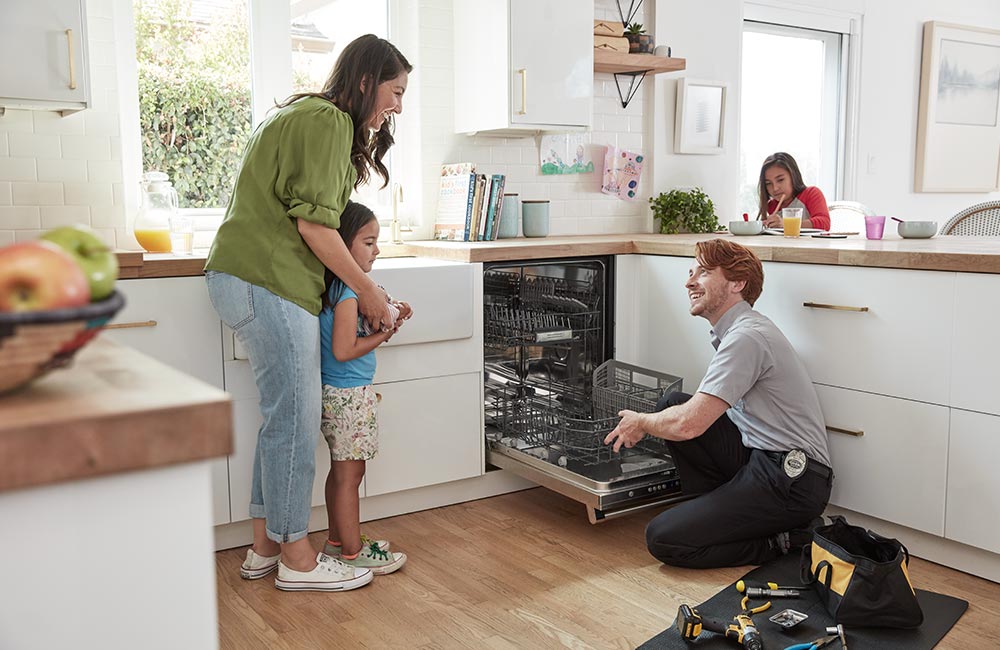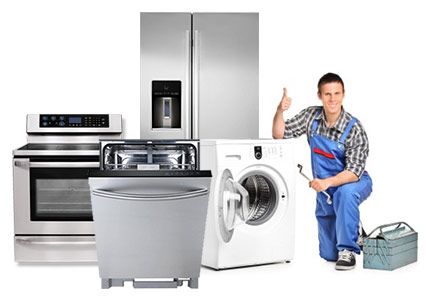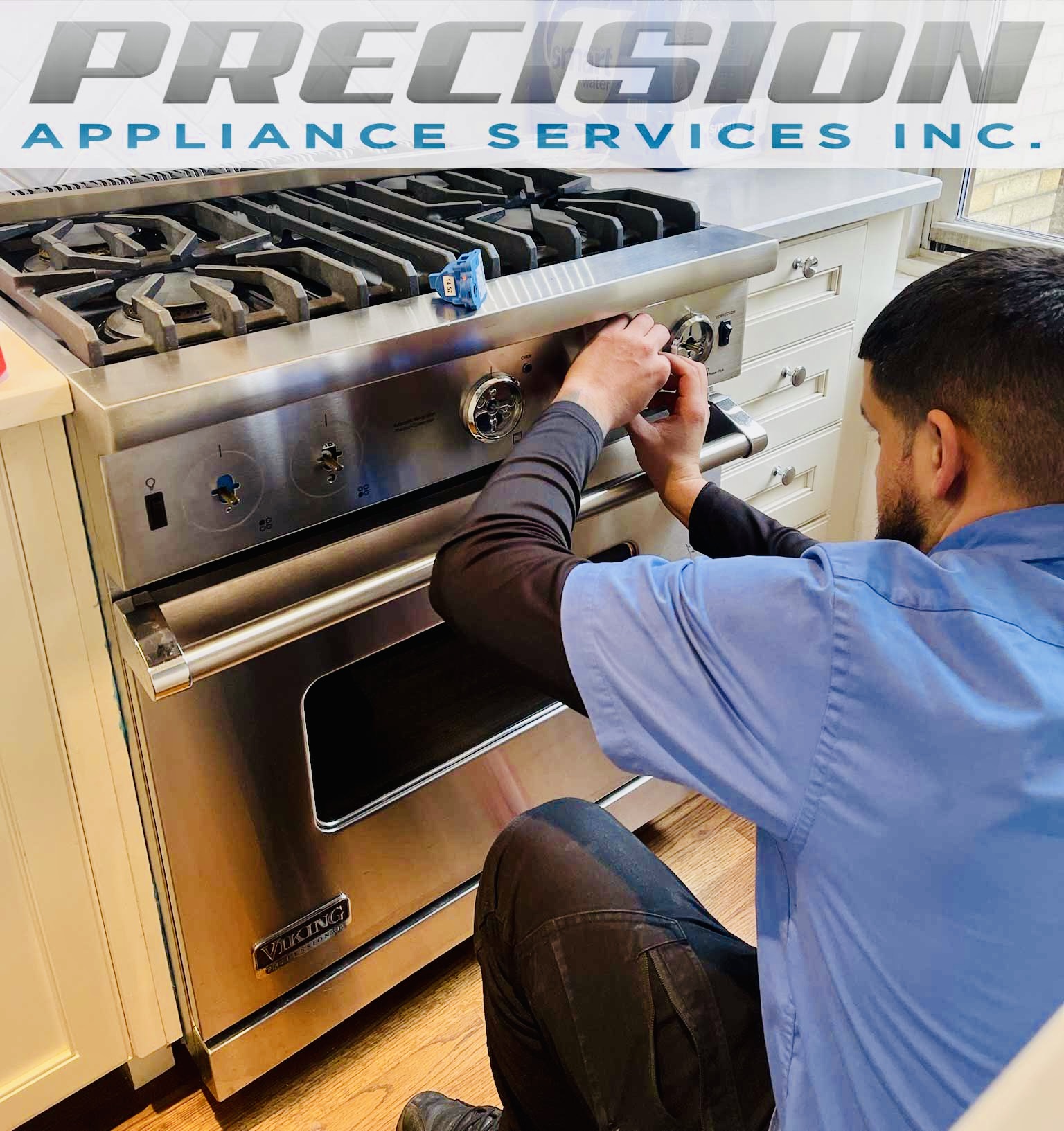The Ultimate Guide to Recognizing Home Appliance Repair Work at Home
When your fridge quits cooling or your oven declines to warmth, it can really feel frustrating. Comprehending home appliance repair in your home can conserve you money and time. You'll discover to recognize symptoms, use crucial devices, and adhere to an organized troubleshooting procedure. Before you start, there are vital safety preventative measures you require to take right into account. What are one of the most usual troubles, and exactly how can you repair them? Let's explore the basics.
Typical Home Appliance Problems and Their Symptoms
When your home appliances start breaking down, it's essential to identify the indicators at an early stage. Disregarding them can cause bigger concerns and expensive fixings. If your fridge isn't cooling down properly, you could notice warm areas or condensation developing. This might suggest a falling short compressor or a blocked vent.Your dishwashing machine may show problems with unclean dishes or unusual sounds throughout cycles. If you hear grinding or clanking, it's time to investigate.A cleaning machine that will not rotate or drain can leave you with soaked washing, recommending a clogged up drain or a malfunctioning pump.Lastly, if your stove's temperature level appears off or it takes forever to pre-heat, you may be managing a faulty thermostat. By staying sharp to these symptoms, you can attend to issues before they escalate into significant repair services.
Important Devices for Device Fixing
When you're tackling home appliance repair services in the house, having the right devices is essential. Fundamental hand devices like screwdrivers and pliers will assist you disassemble and deal with different appliances, while electric screening devices ensure you're functioning securely with wiring. Let's go over what you need to begin on your fixing trip.
Fundamental Hand Tools
Having the right tools is necessary for efficient home appliance repair in your home. Begin with a trustworthy screwdriver collection, consisting of both flathead and Phillips kinds, as screws prevail in home appliance setting up. Pliers are also crucial; they assist with gripping, turning, and reducing cables or little components. A pair of needle-nose pliers can reach difficult situations easily. You'll require an excellent adjustable wrench for tightening or loosening up nuts and screws. An utility knife comes in handy for puncturing product packaging or insulation. Lastly, don't forget a tough workbench or surface area to securely organize your tools and parts. With these standard hand tools, you'll be well-prepared to deal with most device repair services that come your way.
Electrical Screening Gadgets
Together with fundamental hand devices, electric testing devices play a vital duty in appliance repair work. These devices help you identify electric issues and guarantee home appliances operate safely. A multimeter is crucial; it measures voltage, current, and resistance, allowing you to determine issues quickly. A non-contact voltage tester is an additional essential, allowing you find live cords without making straight contact, improving your safety. Secure meters are terrific for gauging existing flow in cords without separating them, conserving you effort and time. Additionally, circuit testers can rapidly inspect if electrical outlets are operating properly. By utilizing these gadgets, you'll enhance your troubleshooting procedure and boost your repair skills, making device upkeep a whole lot less complicated.
Step-by-Step Guide to Diagnosing Appliance Issues
When your device acts up, it can be irritating, but diagnosing the issue doesn't need to be overwhelming. You'll learn to identify usual troubles and use reliable repairing methods. Allow's go through the actions to get your device back in functioning order.
Usual Device Problems

Troubleshooting Strategies Explained

Repairing Major Kitchen Home Appliances: A Closer Look
Have you ever before wondered exactly how to tackle usual problems with your kitchen home appliances? Fixing significant kitchen area home appliances like refrigerators, stoves, and dishwashers can be easier than you think. Begin by identifying the problem-- whether it's a refrigerator not cooling or a stove that won't heat up. Typically, a straightforward reset or inspecting the power source can resolve the issue.For refrigerators, clean the condenser coils and inspect the door seals. If your oven's not home heating, inspect the heating aspect and thermostat. Dishwashers could simply need a clean filter or a reset to obtain them back in activity. Always disconnect the appliance prior to diving into repair services to ensure your safety.Don' t fail to remember to seek advice from the individual manual for certain troubleshooting ideas associated with your model. With a little perseverance and the right tools, you can with confidence tackle home appliance fixings and save money while doing so!

Troubleshooting Laundry Appliances: Tips and Techniques
When your washing devices start breaking down, it can really feel overwhelming, but fixing them does not need to be a headache. Begin by checking the power supply. Validate the appliance is connected in and the outlet is functioning. Next off, inspect the door or cover button; a faulty button can protect against the device from operating.For washing machines, if it's not spinning, look for unbalanced lots. Redistributing the clothes may resolve the concern. If your dryer isn't home heating, tidy the dust filter and examine the vent for blockages.Listen for unusual sounds; they can indicate an issue. If your home appliance is dripping, check the tubes for fractures or loose connections. Document any type of error codes displayed on electronic displays, as they can guide you in recognizing the issue. Consult the user handbook for certain fixing suggestions connected to your design.
Safety And Security Preventative Measures to Take During Repair works
Before you start any type of device repair services, it's vital to focus on security to stop crashes or injuries. Initially, disconnect the appliance or shut off the breaker to assure no power reaches it while you function. Usage shielded devices to reduce the risk of electric shock. Wear safety goggles and handwear covers to protect on your own from sharp edges or debris (Dependable Refrigeration & Appliance Repair Service Washing Machine Repair).Make particular your workspace is tidy and well-lit, so you can see what you're doing. Keep kids and animals far from the location to stay clear of interruptions and potential threats. If you're managing gas devices, be extra cautious; check for leakages prior to proceeding.Take your time, and don't rush through repair services. If you feel unsure about any kind of step, it's better to stop briefly and research than to guess. Following these precautions will certainly assist produce a much safer setting for your do it yourself appliance repair job
When to Call an Expert for Help
Just how do you recognize if it's time to call a specialist for appliance repairs? If you've attempted basic troubleshooting without success, it's a clear indicator. If your appliance still won't start or shows uncommon noises after resetting it, don't wait to look for professional help.When you notice leaks, smoke, or shedding smells, focus on safety and call a pro quickly. These concerns can result in more considerable damages or pose dangers to your home.Also, if your appliance is under service warranty, contacting an expert is typically the very best route. They can guarantee that fixings won't nullify your service warranty, saving you money in the long run.Finally, if you're uncertain or uncomfortable with intricate repair work, it's important to leave it to the professionals. Keep in mind, dealing with difficult problems without the ideal knowledge can result in expensive errors. Count on a professional when in uncertainty!
Often Asked Inquiries
How Can I Stop Device Issues in the Future?
To stop device problems in the future, you need to carry out regular maintenance, look for damage, tidy filters, and prevent overloading. Staying positive will aid prolong their lifespan and keep them running smoothly.
What Are one of the most Typical DIY Home Appliance Repair Mistakes?
You may ignore safety and security preventative measures, skip fixing actions, or make use of inaccurate tools when trying DIY appliance fixings. Hurrying the procedure or ignoring maker guidelines can cause more substantial problems and expensive errors. Keep client and educated!
How Do I Know if a Part Needs Substitute?
You can inform if a part requires substitute by inspecting for uncommon sounds, leakages, or inconsistent performance. If the appliance has a hard time to operate properly or reveals visible damages, it's likely time for a replacement.
Can I Use Generic Components for Device Services?
Yes, you can use common components for device repair work, but determine they work - Washer dryer repair service Dependable Refrigeration. Common components could conserve you cash, but they might impact efficiency or longevity, so evaluate your options thoroughly prior to deciding
What Service Warranties Cover Home Appliance Repairs?
A lot of appliance service warranties cover repair services for making defects, however they commonly leave out damage from abuse. Check your service warranty terms meticulously, as some might require utilizing qualified professionals and initial components for coverage to continue to be valid.